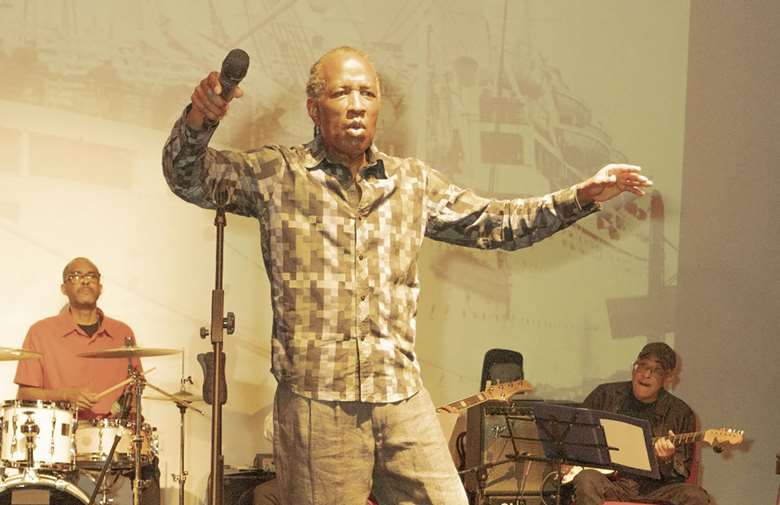'King' David Rudder kicks up a Carnival beat at Tabernacle, London
Kevin Le Gendre
Friday, November 3, 2023
Kevin Le Genre toasts a stand out London show from this beloved calypsonian hero

A bell rings out loud and clear in the balcony. Its sharp, brassy brightness pierces the humming bass drawl of a conch shell while the crackle and gurgle of maracas is in the back row. These instruments are played by the audience in response to what they hear on stage, cutting through any notional dividing line between themselves and the ‘official’ musicians, making it clear that the ‘band’ is what we are in as well as what we have come to hear. To a certain extent this is the real Notting Hill carnival, a few months after the event, held at the Tabernacle community centre, that has been a hub of Trinidadian culture since the Windrush. For the 75th anniversary of the arrival of another batch of West Indians in Britain, though their presence dates back to the Middle Ages, it could not be more fitting to have ‘King’ David Rudder on a three night run. The great calypsonian of the 1980s, 90s and millennium would be a Moses or Messiah rather than a monarch in biblical terms given the way that he literally as well as figuratively leads the sold out crowd from their seats to within a few feet of him in what is a sensational performance. Indeed his first two classic albums The Power & The Glory and Haiti underlined the importance of faith and politics in his oeuvre and when the 70 year-old from Belmont tells the unknown percussionist in the crowd to ‘call the spirits’ there is an important nod to religion which could be European, African, and Asian, a singular Caribbean trinity of Jesus, Shango and Shiva.
In any case Rudder runs through a vast back catalogue which a responsive audience laps up, and if the poetic image of the distant drum on ‘Calypso Music’ lay bare his debt to Kitchener, Sparrow and Roaring Lion then the then enduring compositions such as ‘Trini 2 De Bone’ and ‘The Hammer’ show how evolution came from their revolution. The sway and swing of pianist Felix Ruiz’s band, replete with Afro-Latin and Brazilian rhythmic inflections, particular when it broke down to just cowbells, congas and shakers, eased into the harder, heavier groove of soca, complete with a more marked emphasis on the bass drum, and the stylistic range only emphasized how Rudder, like all significant artists, has made his own present and future from the past.
The whole evening was framed in those terms, though. The two opening acts, veteran, if not indefatigable calypsonians paid tribute to two of their legendary predecessors who arrived on the Windrush. De Alberto reprised the songs of Lord Beginner, of which Victory Test Match, a eulogy to the sport once dominated by the West Indies, ‘cricket, lovely cricket’ was smashed beyond a boundary, which is thought provoking given the descent to duck world of the current team. Interestingly, saxophonist Dave Bitelli, a stalwart of the British scene, played clarinet rather than tenor on this and other classic 50s calypso numbers, emphasizing the musical kinship between Trinidadian folk and early jazz, suggesting Bechet would have been at home in Port Of Spain as well as New Orleans. Equally vibrant was Tobago Crusoe, assigned to the role of Lord Kitchener, who brought the house down with the sharpness of his wit and humour before he’d even hit a note. The quip that he’d spent more on his fancy jacket and hat, in honour of his subject’s famously dapper threads, than he was getting paid for the gig was the kind of gentle irony that we can take as winter bills pile up.
But Crusoe’s renditions of Kitch’s music bring out much more than richness of melody and pithiness of lyric. They chart the emotional shift of the 1948 migrants, who were openly referred to as ‘coloured colonials’ no less, from sunny idealism to gloomy realism. ‘London Is The Place For Me’ hails the mother country but ‘Food From The West Indies’ is a plea for home cooking that is bake and saltfish rather than beans on toast. These deliciously expressed servings of both irony and nostalgia are anything but inconsequential simply because calypso slides so skillfully between narratives that are deadly serious and raucously funny, and Crusoe’s tangy repartee makes him equal parts stand up and singer. Emcee Martin Jay, who has championed calypso and soca on UK airwaves for over 30 years, even sings a tune, though he fully recognizes he could be Lord Janitor give the amount of keys he runs through. Major, minor or middle order matters none because every commoner is a blue blood tonight. Kings and queens are holding up Trinidad’s national colours of red, white and black.